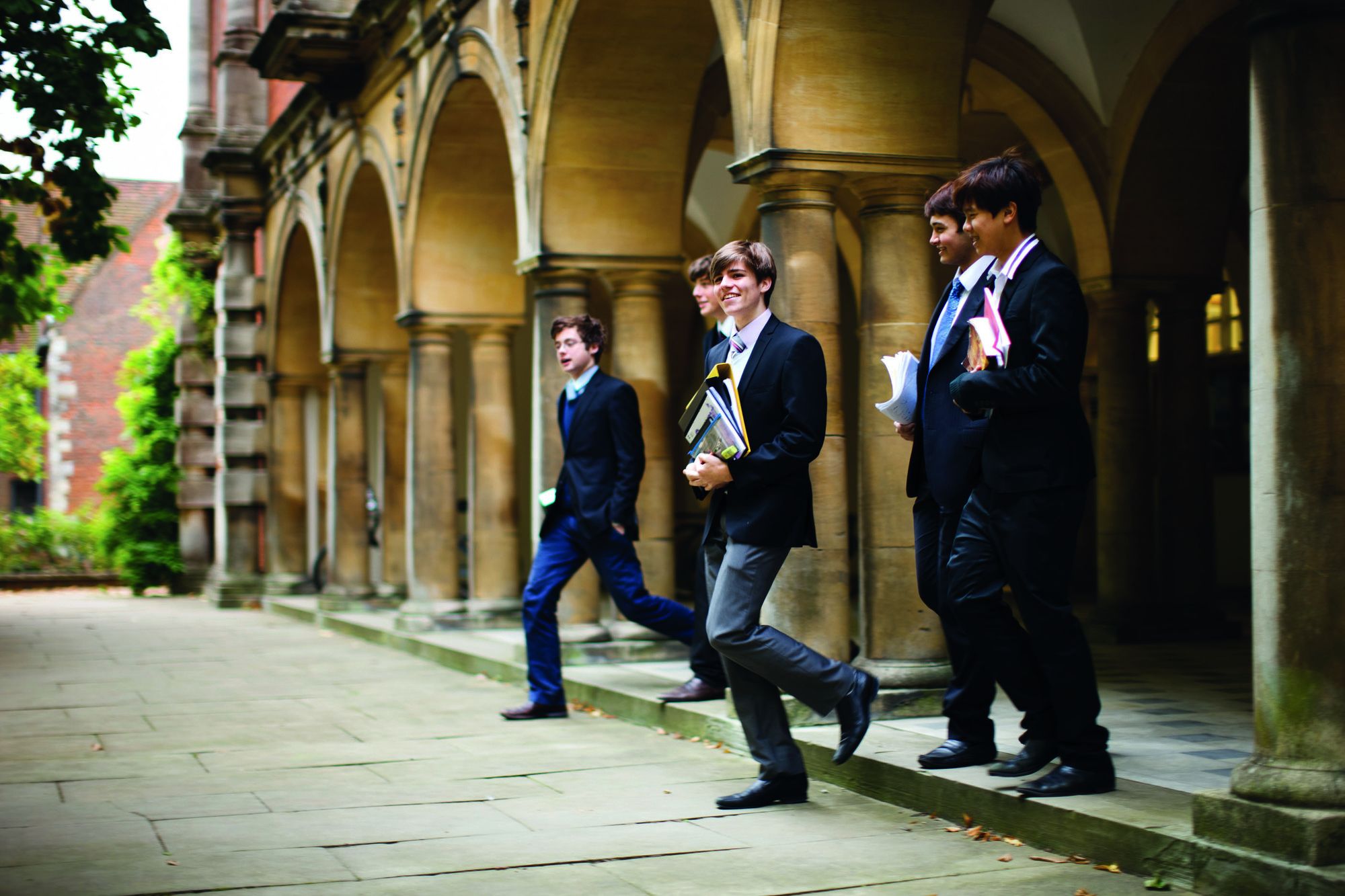
At the weekend we crossed the border to stay with friends in Winchester for a couple of days. Winchester has a good claim to be called the heart of England. It was the capital of Alfred the Great, and remained a capital city of some sort until London usurped its title at the end of the middle ages. Today it’s mildly mixed in a political sense – the LibDems are roughly as strong as the Tories – but at heart it’s a wealthy, conservative place. House prices are as high as anywhere outside London. Unusually for British towns in 2019 there are few deserted and boarded-up shops, and you can almost scent the well-being of most people in the streets. Swansea makes the strongest of contrasts.
Winchester has something else that Swansea lacks: one of Britain’s leading ‘public’ schools. Our friends live near the centre, near one of the places where the pupils of Winchester College live, and you can’t avoid seeing them walking through the streets. They wear formal clothes and smart shoes, carry files and books under their arms (satchels are clearly passé), call loudly to one another, and move about with a confident, self-possessed stride. There aren’t many of them, compared with the rest of the school population of the city: only around seven hundred. But they and their buildings seem to dominate the city.

If you wanted to send your offspring to Winchester College, what would you do? First, you’d need to make sure that you’d not produced a daughter: only boys allowed. Second, assuming you have a son, you should be prepared to say goodbye to him for most of the year: Winchester has boarders, but no day-boys. Third, you’ll need a steady stream of serious cash. The first stage is to pay £375 just to ‘register’ your son. Then you hand over £500 for the privilege of sitting the entrance exam (generously, this sum is refunded if your son fails). If he passes, you’ll be asked for another sum, of £2,500 (£5,000 if you’re from outside the EU) as a ‘deposit’. Only then do you start paying the fees, which will cost you £41,709 a year. This might sound a lot, but you can reduce it a bit by paying five years’ worth of fees in advance of your son entering the school. There’ll be many extra costs on top of all this.
What if you don’t possess enough money to pay? Well, you could apply for a means-tested Bursary, which will reduce (but not avoid) the fees. There aren’t many of these, though the College has an ‘ambition’ to increase their number. (No doubt this arrangement helps prove that the school qualifies as a ‘charity’.) If your son is a promising golfer, it seems that getting a Bursary might prove easier.

What will your son receive for the money? An excellent all-round academic education, if you can believe the (rather sparse) statistics the College includes on its elegant website. In addition, the chance to benefit from the exceptionally well-resourced facilities provided for sport, the arts and other non-curricular activities, and the wide range of student societies. Around 500 employees serve the 700 boys, a staff-student ration that can only be called extraordinary. It would be surprising of your son didn’t emerge with good enough results to ease his way into Oxbridge, or another Russell Group university, or an Ivy League university in the US. ‘Virtually all the College’s pupils enter higher education at leading universities and institutes both in the UK and increasingly around the world’, says the College’s annual report. (Contrast Welsh comprehensives: when I ask classes on school visits how many people are hoping to go to university, often many fewer than half raise their hands.) Your son would also be equipped with the friendship and acquaintanceship of enough fellow-Wykehamists (Winchester College members or ex-members), whom he might be able to take advantage of in later life.

All these are real benefits, but there’re really just instrumental benefits. What you’d really be buying for your son is something the College’s website is coy about: a position of power, authority and influence in society when you reach full adulthood. This is the real meaning of the College’s motto, ‘Manners makyth man’. The Headmaster has a different interpretation: ‘its sentiment is that we should be measured not by birth but by our personal qualities: a surprisingly meritocratic sentiment for a school that was founded in 1382’ – but ‘meritocracy’ is hardly the right word for a system that’s designed as a guarantor of inherited privilege. What the College promises to provide is ‘a future of compassionate leadership’. It’s a revealing phrase: Wykehamists are naturally ‘trained to lead’, as in the days of Empire – rather than to serve, say, or to co-operate with others. And ‘compassionate’ sounds warm but, from the towering heights of ‘leadership’, is really another word for ‘paternalistic’ or ‘condescending’.

A rough marker of how an institution like Winchester College dominates the heights of British society is to check how many of their alumni are listed in the establishment bible, Who’s who. There are around 350 people in the current edition who claim to have been boys at Winchester. Compare the number who attended St Teilo’s School in Llanedyrn, Cardiff, the last school I visited in Wales (number of pupils: nearly 1,500). There are just two St Teilo’s entries in Who’s who. Wykehamists get to the highest places everywhere: politics, the civil service, the Church, the armed forces, banking, the law, and prestigious academia. Many, I’m sure, are people of great ability. But how many would have reached their current position had they started off in St Teilo’s School? And how many pupils of St Teilo’s might have reached similar heights if Winchester School and their like did not maintain such a stranglehold on pathways to power?
The bare truth is that public schools are a powerful engine of reproducing privilege and power in our society, and of denying equality of opportunity to all. In Westminster politics the effects of their influence are as strong now as they were 150 years ago. Three of the leading politicians of the last ten years, David Cameron, George Osborne and Boris Johnson, were chums from just two other leading public schools, Eton and St Paul’s. The unshakeable self-belief of these men and, much worse, the readiness of people who’ve never set foot in a public school to defer to their right to govern, has led directly to many of our current ills. Were it not for Eton College it’s hard to see how Boris Johnson – an egomaniac, an incompetent, a liar and an immoralist – could get anywhere close to being Prime Minister.

Recently several books have been published, including those by Robert Verkaik and David Kynaston and Francis Green, about the iniquities of public schools and their effects. It’s interesting that their influence, insofar as they’ve wanted to advocate change of a radical or not so radical kind, has been negligible. Political parties have shown few signs of proposing serious measures to curb the power of public schools. The supposedly ‘radical’ Labour Party manifesto for the 2019 general election only proposes ‘closing tax loopholes’ – presumably by removing their undeserved charitable status. But until as a society we’re prepared to tackle their dominance, public schools will continue to conspire with all the other machines of privilege to reinforce the grossly unequal and wasteful society we live in.
Winchester College was founded in 1382 by William of Wykeham, Bishop of Winchester and Chancellor of England, specifically to give an education to children from families who earned less than five marks a year (not a large sum). Over the years his intention was subverted, or rather inverted, and the College became what it is today, a walled domain of the very rich. Maybe one day it will revert to its ancient ideal, and the boys will cease to strut the streets of the city with the certainty of advancement.

Leave a Reply